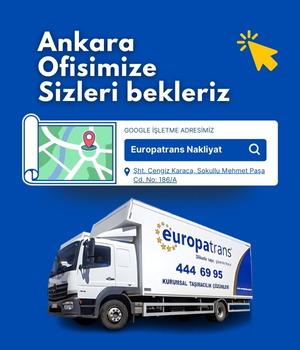Are you looking to expand your business to international markets? As you consider shipping your products abroad, it’s important to understand the various regulations and requirements involved in international shipping. From navigating customs and import/export documentation to selecting the right shipping method and managing transportation costs, there are many factors to consider. In this post, we will delve into the key aspects of international cargo shipping, including packaging and labeling requirements, and why you should choose our services for your overseas transportation needs. Whether you’re a small business or a large corporation, understanding these regulations will be crucial for your success in foreign markets.
| ✅ Eşya Taşıma Sigortası : | Allianz Sigorta Hizmeti |
| ✅ Hizmet : | Transportation Of Goods Abroad |
| ✅ Firma Faaliyet Belgeleri : | C3-Yetki Belgesi |
| ✅ Firma İletişim Bilgileri : | 444 6 995 |
Understanding International Cargo Shipping Regulations
When it comes to Transportation Of Goods Abroad, understanding international shipping regulations is important. Navigating the complex world of cargo shipping regulations can be a daunting task, but it is essential for businesses that are looking to expand their market reach and transport goods across borders. International cargo shipping regulations are put in place to ensure the safe and efficient transportation of goods, as well as to prevent illegal trade activities. As such, it is important for businesses to have a clear understanding of these regulations in order to avoid potential legal issues and delays in the transportation process.
One of the aspects is knowing the specific requirements and restrictions for shipping to different countries. Each country has its own set of regulations and standards for importing goods, and it is important for businesses to be aware of these in order to ensure that their shipments comply with local laws. This includes understanding the necessary documentation, labeling, packaging, and licensing requirements for each country, as well as any restrictions on certain types of goods.
In addition to country-specific regulations, businesses also need to be aware of international cargo shipping regulations that apply to the transportation of goods by air, sea, and land. These regulations are put in place to ensure the safety and security of shipments, as well as to prevent illegal or dangerous goods from being transported. Understanding these regulations is essential for businesses to choose the right shipping method and ensure that their goods are transported in compliance with international standards.
Why should you choose us?
When it comes to Transportation Of Goods Abroad, you need a reliable and efficient partner to ensure that your products reach their destination safely and on time. This is where Europatrans comes in.
With years of experience in international shipping and logistic, we understand the challenges and complexities of transporting goods overseas. Our team is dedicated to providing superior customer service and tailored solutions to meet the unique needs of each client.
When you choose Europatrans as your shipping partner, you can have peace of mind knowing that your shipments are in good hands. Our extensive network of carriers and agents allows us to offer competitive rates and reliable transit times, ensuring that your products arrive at their destination without delay.
Selecting The Right Shipping Method For Transportation abroad.
When it comes to selecting the right shipping method for transportation abroad , there are several factors to consider. The transportation of goods abroad requires careful planning and coordination to ensure that the products arrive at their destination in a timely and cost-effective manner.
One option for abroad transportation is using a freight forwarding service, such as Europatrans. Freight forwarders specialize in arranging the transportation and delivery of goods from one location to another, including international shipments. They have the expertise and experience to navigate the complexities of international shipping, including customs regulations, import/export documentation, and transportation logistics.
Another option in abroad transportation is utilizing air, sea, or land freight. Each way of transportation has its own advantages and disavantages, depends on the nature of the goods being transported, the destination, and the desired delivery schedule. For example, air freight is generally faster but more expensive than sea freight, while sea freight is more cost-effective for large or bulky shipments.
Navigating Customs And Import/Export Documentation
When it comes to Transportation of Goods Abroad, navigating customs and import/export documentation is an important part of the process. Without proper understanding and adherence to the regulations and requirements, shipments can be delayed, rejected, or even sized. In Europatrans, we understand the complexities of international shipping and work closely with our clients to ensure smooth customs clearance and compliance with all import/export documentation.
Customs clearance involves the submission of various documents to the customs authorities of the importing country. These documents typically include a commercial invoice, packing list, bill of lading or air waybill, and any other specific documents required by the importing country. Failure to provide the necessary documentation can result in delays or even the refusal of entry for the goods. In Europatrans, we have a team of experts who are well-versed in the documentation requirements of different countries, allowing us to assist our clients in preparing and submitting the necessary paperwork accurately and in a timely manner.
Import/export documentation also plays a very important role in ensuring compliance with international trade regulations. This includes obtaining the required export licenses, permits, and certificates, as well as ensuring compliance with export control regulations and trade sanctions. With our extensive experience in international shipping, Europatrans can provide guidance and support to our clients in understanding and fulfilling the necessary documentation and regulatory requirements, minimizing the risk of non-compliance and potential penalties.
Packaging And Labeling Requirements For International Shipments
When it comes to packaging and labeling requirements for international shipments, there are number of regulations and guidelines that must be followed to ensure that your goods are transported abroad safely and efficiently. For businesses looking to expand their reach to foreign markets, understanding and adhering to these requirements is crucial for successful transportation of goods abroad.
One of the considerations when transporting goods internationally is the packaging itself. Proper packaging not only protects the goods during transit, but also ensures that they arrive at their destination in good condition. Packaging requirements may vary by country and region, so it’s important to be well-versed in the specific regulations of the destination country in order to avoid any potential issues.
Additionally, labeling requirements play a vital role in international shipments. Clear and accurate labeling is essential for customs clearance, as well as for ensuring that the goods are handled and transported in compliance with international standards. Working with a reputable transportation and logistics company, such as Europatrans, can help ensure that your packaging and labeling comply with all necessary requirements, thereby minimizing the risk of delays or potential fines.
Managing Transportation Costs And Logistics For Foreign Markets
When it comes to managing transportation costs and logistics for foreign markets, it’s important to partner with a reliable and experienced freight forwarding company. Transportation of goods abroad can present a number of challenges, from navigating complex customs regulations to choosing the most cost-effective shipping methods. By working with a trusted partner like Europatrans, businesses can optimize their supply chain and ensure seamless delivery to international markets.
One of the factors in managing transportation costs for foreign markets is selecting the right shipping method. Whether it’s air freight, ocean freight, or a combination of both, it’s essential to choose a method that balances cost with reliability and speed. With Europatrans‘s expertise in global shipping, businesses can access a wide range of transportation options to suit their specific needs. This flexibility allows for cost-effective solutions without sacrificing quality or efficiency.
In addition to selecting the right shipping method, businesses also need to consider the logistics of international transportation. This includes coordinating various stages of the supply chain, from warehousing and distribution to customs clearance and delivery. By leveraging Europatrans‘s extensive network and knowledge of international regulations, businesses can streamline their logistics processes and minimize the risk of delays or disruptions.
Frequently Asked Questions
What are the important international cargo shipping regulations to be aware of?
International cargo shipping regulations include customs requirements, import/export documentation, packaging and labeling requirements, and transportation costs and logistics for foreign markets.
How do I choose the right shipping method for transportation abroad ?
The right shipping method for transportation abroad depends on the type of goods being shipped, the destination, and cost considerations. Options include air freight, ocean freight, and express courier services.
What is involved in navigating customs and import/export documentation?
Navigating customs and import/export documentation involves ensuring that all required paperwork, including commercial invoices, packing lists, and certificates of origin, is accurately completed and submitted to customs authorities.
What are the packaging and labeling requirements for international shipments?
International shipments must meet specific packaging and labeling requirements to ensure safe and efficient transportation. This may include using durable packaging materials and labeling shipments with the necessary information for customs clearance.
How can I manage transportation costs and logistics for foreign markets?
Managing transportation costs and logistics for foreign markets involves optimizing shipping routes, consolidating shipments, and leveraging freight forwarding services to reduce costs and streamline the supply chain.
What are considerations for international shipments to ensure compliance with regulations?
Key considerations for international shipments include staying up to date with changing regulations, conducting thorough research on destination country requirements, and partnering with experienced shipping providers.
Why should I choose a shipping provider with expertise in international transportation?
Choosing a shipping provider with expertise in international transportation ensures that your shipments comply with regulations, are handled efficiently, and arrive at their destination on time and in good condition.
Benzer Yazılar
Hizmetlerimiz hakkında detaylı bilgi veya fiyat teklifi almak için buraya tıklayınız.
Ücretsiz danışmanlık veya hizmetlerimiz hakkında ayrıntılı bilgi almak için bize 7/24 mesaj atmaktan çekinmeyin.
Eşyalarınızın hacmini metreküp cinsinden öğrenmek istiyorsanız, buraya tıklayarak hızlı bir şekilde hesaplayabilirsiniz.





